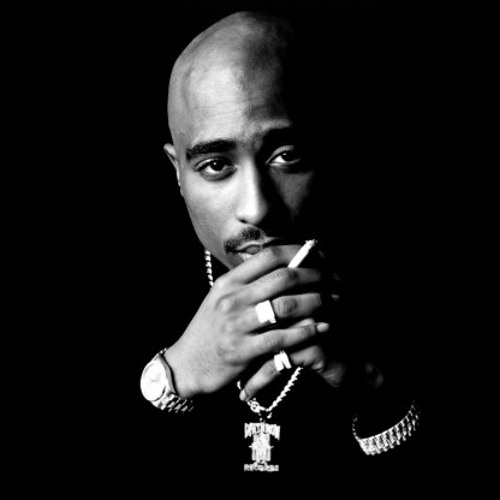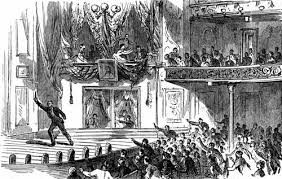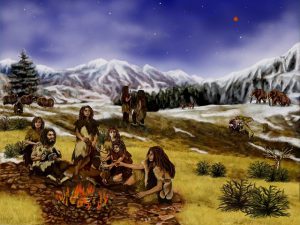Close your eyes and flashback to Harlem, New York in the 1970’s; you hear the unique dialect of thugs, pimps, and prostitutes alongside the upbeat rhythm of culture-rich music. You hear the tension of drug deals, the cries of hungry homeless children out in the cold, and the crackling of the fires of buildings being burnt down and soon to be abandoned. You hear police sirens fill the streets, and the cracking of police batons on the ribs of individuals who plead their innocence. But more importantly, you hear the silent screams of the oppressed on their last straw. Right smack in the middle of this revolutionary explosion, in 1971, was born Lesane Parish Crooks—the future Tupac Amaru Shakur.1

Tupac was born into a family that was deeply rooted in the Black Panther Party. The Black Panthers was a group of African Americans who wore iconic black outfits with black berets and emphasized “black pride.” They fiercely fought for human and civil rights, but more importantly, against police brutality. Although a social movement, they stood out from other movements of that time because, unlike other groups, they used violence to rebel. It was founded by Huey P. Newton and existed through the 1960’s-1970’s.2 His mother, Afeni Shakur, was guilty of 156 counts of crime due to her involvement with the Panther movement, and was in prison while pregnant with Tupac. Although lacking a high school degree, Afeni was incredibly smart. She was known for her public speaking, and when eight months pregnant, she acted as her own lawyer and won the case, getting her released from prison on account of a lack of evidence.3 From early in his life, Tupac lacked a father figure, and it is because of this that he was especially close to his mother and had much respect for her as a single, struggling parent. His godparents, two renowned Black Panther members, Assata Shakur and Elmer “Geronimo” Pratt, had important roles to play in the Panthers organization, so one could only imagine how developed Tupac’s sense of social awareness was from a very young age.
Growing up, Tupac automatically had a love for education. He always had the self-motivation to go to school and the instinct to pursue poetry and drama. Considering his lyrical reputation, it’s no surprise that Tupac was skillfully literate, and he soon began using this talent to say what he felt needed to be said. At fourteen years old, Shakur was enrolled in Baltimore’s School for the Arts, and it was here that he started rapping, his first real rap being about gun control.4 It didn’t take long at all for him to notice flaws in the education system and want to improve it. He later commented on how, after awhile, school became so repetitive that he stopped learning things that are actually important. For example, almost every year from Kindergarten to twelfth grade, children are required to take Math, English, and History courses of some sort, each one not being very different from the last. He felt kids lacked the opportunity to learn “important things,” such as how to complete their taxes, manage finances, and more; things, for example, that revolved around having street smarts and daily practicality. He had no hesitation taking on a leadership role, and took advantage of immediately getting involved. In high school, he started campaigns educating kids about safe sex, in a neighborhood where the rate of AIDS among teenagers was very high. He and some of his friends even wanted to restart the Black Panthers. But instead of the use of violence, his goal was to use his words to get his points across. Tupac particularly emphasized the importance of education, especially among the youth, and the importance of children being raised with the necessary mindset required for bettering the future, not only for themselves but for generations to follow. He also made it known that he absolutely hated racism, deplored the mistreatment of women, and saw both as result of ignorance.5 Tupac had never lived a luxurious life, but unfortunately, he and his family were faced with sudden financial difficulties. His mother had developed a cocaine addiction, due to her involvement with one of her ex-Panther friends. As her addiction worsened, she became unable to hold a job. This caused Tupac’s family to lose the privilege of being able to stay in one place for long. They had to keep moving, from Harlem to Baltimore, then to California, until they were eventually homeless. In 1988, at seventeen years old, Tupac was eventually forced to drop out of school and start selling drugs to pay the bills and support his family.6

Thankfully, a couple years later, in 1990, Tupac joined the HipHop group Digital Underground, and became a background dancer for them. He was also getting roles in movies, such as Ernest Dickerson’s film Juice.7 Tupac was juggling acting as well as rapping, with both really putting his name in the entertainment realm. His rap career really took off in 1991 when his first solo debut album, 2Pacalypse Now, was released.8 In this album, he raps about life in the streets for African Americans, especially in regards to police brutality, poverty, and the war on drugs. It was a real contrast to the stereotypes that rap just contained vulgarity and glamorized delinquent behavior. His frank tone and attitude immediately drew a lot of attention towards these hypersensitive topics, which were otherwise overlooked. Tupac Shakur was giving a new name to Gangsta Rap.9
2Pacalyse Now was arguably the most revolutionary compilation of Tupac’s career, because it sparked such a wide variety of emotions. In this album, not only did he identify problems of the ghetto, but he gave reasoning as to why they persisted, as well as even giving viable solutions, with his most emphasized solution being education. In his song, “Rebel of the Underground,” Shakur states,
“The most dangerous weapon: an educated black man.”10
Also in his 2Pacalypse Now album, in his song “Violent,” he talks about his blunt attitude, and his persistence to expose issues of the ghetto was being confused for violence. In this song, he states,
“They claim I’m violent just because I refuse to be silent…I will rebel against any oppressor and this is known as self defense…Unlock my brain, break the chains of your misery…My words are weapons and I’m steppin to the silent… Wakin up the masses, but you claim I’m violent.”11
Another profound piece on this album was his song “Words of Wisdom,” in which he directly speaks to those who are socially oppressed; more specifically, the African Americans of the lower class. He directly calls out problems regarding drugs, economic inequality among the classes, and how the education of kids in the ghetto is neglected. In this song, he states,
“It’s wrong to keep someone from learning something. I’m fed up, we gotta start teaching children that they can be all that they wanna be. There’s much more to life than just poverty…Conquer the enemy armed with education. Armed with the knowledge of the place we’ve been, no one will ever oppress this race again.”12
By the age of twenty years old, Tupac Shakur was not only changing a whole genre of music as we knew it, but approaching nationwide issues as no one had approached them before. He was changing the way people thought, how they looked at themselves, their place in society, and the importance of things such as education. He was doing all this through his words. Tupac once stated, “I’m not saying I’m going to rule the world or I’m going to change the world, but I guarantee that I will spark the brain that will change the world.”13 Although he died just five years after the release of his first album, his legacy still lives on today in the minds of those who wish to better the lives of the indigent youth. What do you say? Do you have the spark to change the world?
- Michael Dyson, Holler if You Hear Me (New York: Basic Civitas Books, 2001.), 6. ↵
- Encyclopedia of Activism and Social Justice, 2007, s.v. “Black Panther Party,” by Gary L. Anderson and Kathryn G. Herr. ↵
- Encyclopedia of African American History, 2010, s.v. “Shakur, Tupac,” by Aaron D. Sachs. ↵
- Encyclopedia of African American History, 2010, s.v. “Shakur, Tupac,” by Aaron D. Sachs. ↵
- Historic Films Stock Footage Archive, “Tupac Shakur 1988 High School Interview,” YouTube Video, 36:01, June 12, 2017, https://www.youtube.com/watch?v=v_XT9-C5Qu8&t=82s. ↵
- Encyclopedia of African American History 1896 to the Present, 2009, s.v. “Shakur, Tupac,” by Akil Houston. ↵
- Encyclopedia of African American History 1896 to the Present, 2009, s.v. “Shakur, Tupac,” by Akil Houston. ↵
- St. James Encyclopedia of Popular Culture, 2013, s.v. “Shakur, Tupac (1971-1996),” by Pierre-Damien Mvuyekure. ↵
- Simon Glickman, Tupac Amaru Shakur (Detroit: Gale, 2003), 26-27. ↵
- Anton Larson, “2Pac-Rebel of the Underground (lyrics on screen), YouTube Video, 3:11, May 11, 2012, https://www.youtube.com/watch?v=HKF_FZUjts4. ↵
- artfulgooner, “Tupac Violent Lyric Video,” YouTube Video, 6:27, May 6, 2013, https://www.youtube.com/watch?v=EKW3ps02L_o ↵
- 2Pac4ever, “2Pac-Words of Wisdom with lyrics,” YouTube Video, 4:54, January 7, 2016, https://www.youtube.com/watch?v=EsOVlPKyUME ↵
- EducateInspireChangeTV, “I Will Spark The Brain That Will Change The World-Tupac,” YouTube Video, 1:42, September 15, 2014, https://www.youtube.com/watch?v=uijBebYpoto. ↵



96 comments
Maricela Guerra
I honestly never knew Tupac’s full story, knowing that he was not just like all the other artists in the 80’s and 90’s. He had artistic style, he had the education, and he was well rounded. Making him totally different from everyone else. His music was something of art, you could tell he had heart when writing all these songs through his lyrics. Overall the author of this article did a very well done of telling his story.
Carlos Sandoval
Great article, I am a big fan of rap especially old school rap. His music will still be played through people’s speakers. A lot of his music has a deeper message and it is true poetic justice. The different forms of adversity he faced was unreal. Some of the adversity he faced others still face today, it is hard to believe but it happens.
Irene Astran
I appreciate that you have shed light on an artist that used their voice for activism. I find that several movements across all different races use the quote you showcase that the most dangerous weapon is an educated person of that social group. I have seen a rising number of artists go back to the roots that Tupac had sown. They have found their way back to a platform that will allow them to shed light on different socio-economic issues that our generation face today.
Edgar Ramon
I was not familiar with the story of Tupac, I only knew he was shot to death. Yes I do think he might have talked about his life experiences through the lyrics of his songs. It was definitely a worthy pursuit to ‘Spark the brain’ of the person who might change the world. Although I would change some of the things he said to tell kids in 2pacalypse, about kids being able to be anything, in a more sincere approach you can convince kids that hard work is the way to reaching not anything you want to be but, something a lot better.
Austin Pena
Great article. Tupac was truly a revolutionary in his own way and an artist to be considered one of the greatest of all time for the hip hop genre. It seems as if he was almost destined to be this figure that would start an awakening of sorts within the minority community. His discography is one that matches the greats and it nice to see that their are artist still out that continue to spread his message, the most recent I would say would have to be Kendrick with this critically acclaimed album To Pimp A Butterfly.
Isaac Rodriguez
I really enjoyed this article. I liked that the opening paragraphs provided a powerful description of the environment in which he was raised and mentioned some of the struggles his family faced. I find it interesting that his family has had a history of activism. Tupac’s efforts to fight inequality is inspiring and is what makes him one of the greatest rappers of all time.
Gilberto Gomez
Very informative article that relates to our current reality. Years have passed since the death of Tupac Shakur and we are still facing the same issues. It is interested to see the other side of Tupac’s story, one that I was unacquainted of. Although his music will live forever, his mind and soul is what will carry his name. Overall, an enlightening and intellectual article that shows where our society stands on civil rights.
Erin Vento
This was such a great article. Tupac’s music is always going to be timeless, but there was so much about his life I had never heard before. This article showed that he probably deserves to be talked about and respected more for what he’s done and the things he accomplished even before his first album. His ideas haven’t aged, and he found a way to talk about them and spark conversation and ideas that are still being held today.
Hannah Wilson
This was a really good article. I did not know much on the history of Tupac. I thought hat including some information about his mother was really interesting. It helps show where he got his attitude of fighting for what he believes in. I think that by speaking through the rap genre he was able to speak to people that needed to hear his words the most and a younger generation.
Derek Esquivel
I really love this article because I love Tupac. He is, in my opinion, the greatest rapper to ever live. Todays rap music is all the same and doesnt give a clear message like Tupac would in his music. He would tell stories of what he had to go through and what needed to be done, he was the voice that everyone needed. I still want to believe that he may still be alive but who knows theres a lot of conspiracy theories around that I am just glad I am able to listen to his music and his messages.